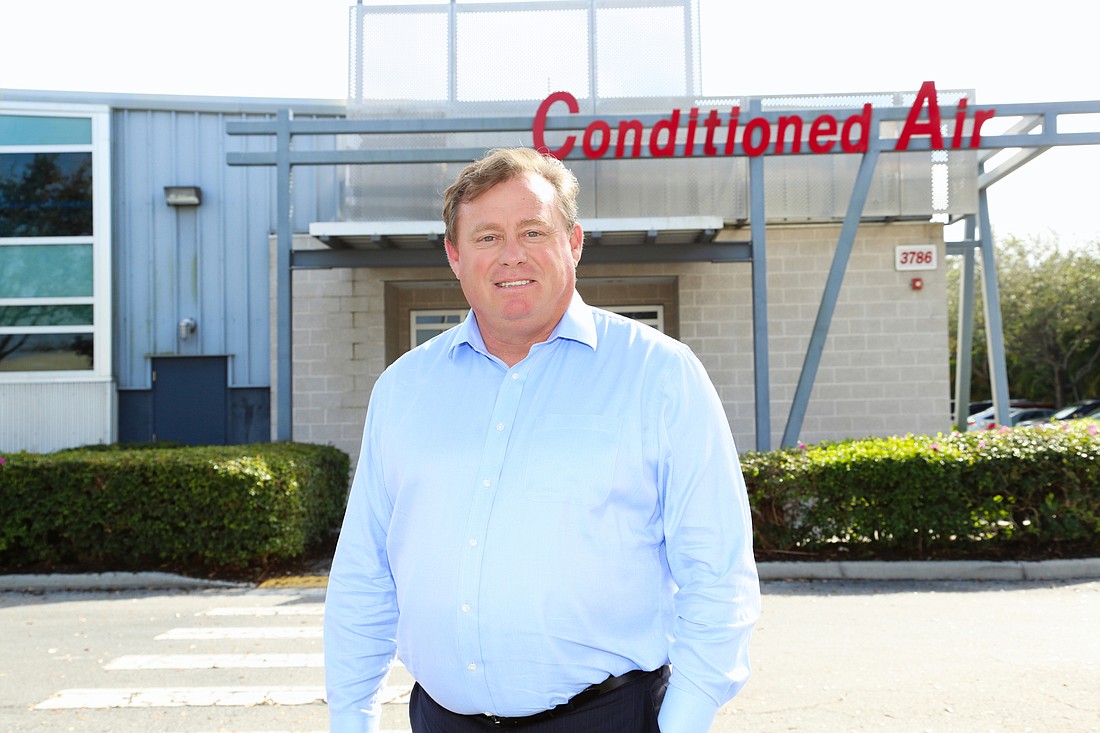- December 15, 2025
-
-
Loading

Loading

Greg Johnson had barely been CEO of Conditioned Air, one of the largest and most established HVAC firms in the region, for a month when he threw down a growth gauntlet: “I think we could double in size in five years,” says Johnson, named CEO of the Naples-based firm Jan. 12. “That’s in revenue and customers, with a focus on recurring services.”
That would put the company at over $117 million in annual revenue by 2027. As it is, Conditioned Air has been steadily growing for years, to $58.53 million in revenue in 2021, up 5.7% over 2020. With 354 employees, the company, founded in 1962, serves customers in Collier, Lee, Charlotte, Sarasota and Manatee counties. It handles light commercial and residential HVAC systems, including design, engineering, installation and maintenance of new construction, refrigeration, indoor air quality and dehumidification systems.
Johnson not only wants to see Conditioned Air get bigger, but, with a constant improvement mindset, better. And in one way, he’s already seen that, with a bend-but-don’t-break mantra during the depths of the current supply chain fiasco. “The supply chain crisis actually made us a better company,” he says. “We are much better at planning now. When we come out of this on the other side, we will be more efficient.”
Johnson, also named executive chairman of the company, was brought in to foster the company’s next phase of growth, which company officials say will be a balance of organic and acquisitions. Johnson replaces Tim Dupre, a 24-year Conditioned Air employee who had been president and CEO since 2018. Dupre was named CEO of Naples-based PBS Contractors in December.
Johnson had been semi-retired and living in Arizona when he connected with Conditioned Air board member and former CEO Theo Etzel about joining the firm. Johnson has worked on some 50 mergers in the HVAC and home services industry over the past 30 years. From 2014 to 2019, he was president and CEO of ASRC Industrial Services in Concord, California, where he helped lead the company from $150 million in annual revenue to $750 million. That included 15 acquisitions.
"The supply chain crisis actually made us a better company. We are much better at planning now. When we come out of this on the other side, we will be more efficient." — Greg Johnson, Conditioned Air
Etzel, says Johnson, “wanted to find someone who’s been there, done that, seen it before (and) I had gotten bored in retirement.”
In addition to the M&A side, Johnson, says Etzel, brings a component of building high-performing executive teams to Conditioned Air. The newly formed senior leadership team includes Senior Vice President of Service Jeff Zanella; Senior Vice President of Construction Services Jon Kunz; Director of Human Resources Blanca Beauchamp; and Director of Supply Chain and Logistics Henry Fear. It also includes Diane Arutt Matty, a CPA named CFO of the company in February. “I’m trying to build a team and build a collaborative environment here,” Johnson says. “It’s not an individual sport. No one individual controls the outcome.”
The growth strategy on the acquisition side, says Etzel, is to buy businesses “like a lily pad” jumping from Naples through Sarasota to possibly the Tampa market and maybe someday Northeast Florida. Conditioned Air made its first acquisition in 2019, when it bought Venice-based Honest Air, a 30-employee business that’s since been folded into the Conditioned umbrella.
Both Johnson and Etzel say the capital side of a acquisition won’t be a big obstacle, citing a partnership with a boutique-style private equity firm in Boston. The deeper effort comes in finding and integrating cultures. “Getting the money to do this isn’t hard,” Johnson says, “but you have to respect the customers and employees and make sure everything is done right. Before we get to economics, it’s all about alignment.”
That said, Johnson isn’t sitting waiting for the phone to ring from acquisition targets. “We’re going out there calling and looking and meeting with people,” he says.
Conditioned Air’s biggest challenge, not surprising considering the labor market, is hiring and retaining people. Etzel says the firm has long had the approach that “your employee is your internal customer, so you have to serve them as well” as clients.
Johnson agrees with that philosophy, calling company culture his biggest up-at-night worry. “Are we doing enough to make sure our people know how much we care for them,” he asks, “and if you do that yesterday will you be able to do it again tomorrow?”